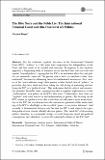Files in this item
The bête noire and the noble lie : the International Criminal Court and (the disavowal of) politics
Item metadata
| dc.contributor.author | Royer, Christof | |
| dc.date.accessioned | 2018-05-28T11:30:06Z | |
| dc.date.available | 2018-05-28T11:30:06Z | |
| dc.date.issued | 2018-05-25 | |
| dc.identifier | 253170986 | |
| dc.identifier | 4c55e7cc-cb77-4966-9159-239ba46f796e | |
| dc.identifier | 85047410158 | |
| dc.identifier | 000466126400002 | |
| dc.identifier.citation | Royer , C 2018 , ' The bête noire and the noble lie : the International Criminal Court and (the disavowal of) politics ' , Criminal Law and Philosophy , vol. First Online . https://doi.org/10.1007/s11572-018-9469-6 | en |
| dc.identifier.issn | 1871-9791 | |
| dc.identifier.uri | https://hdl.handle.net/10023/13571 | |
| dc.description.abstract | For the traditional legalistic discourse on the International Criminal Court (ICC), “politics” is a bête noire that compromises the independence of the Court and thus needs to be avoided and overcome. In response to this legalistic approach, a burgeoning body of literature insists that the Court does not exist and operate “beyond politics”, arguing that the ICC is an institution where law and politics are intimately connected. The present article seeks to contribute to this “non-traditional” literature by addressing two of its fundamental weaknesses: First, writers of the “non-traditional camp” often present a rather limited view of “politics”; in particular, they have shied away from taking the radical step of portraying and analysing the ICC as a “political actor”. This undermines both its critical and constructive potential. Secondly, these commentators offer a simplistic explanation as to why “traditionalists” treat politics as the ICC’s bête noire: Traditionalists, they claim, are “legalists” with scant interest in and understanding of politics. By focusing on the ICC’s nature as a political actor, this article does not only paint a more nuanced picture of the ICC but also demonstrates the constructive potential of this understanding of the ICC to shed light on the so-called “peace versus justice dilemma”. And secondly, it demonstrates that precisely because the ICC is and ought to be a prudent political actor, it must officially disavow politics. The “noble lie” of disavowing politics, therefore, is a prudential strategy to avoid dangerous moral and political consequences and, ultimately, to secure the continued existence of the ICC itself. | |
| dc.format.extent | 22 | |
| dc.format.extent | 648697 | |
| dc.language.iso | eng | |
| dc.relation.ispartof | Criminal Law and Philosophy | en |
| dc.rights | © The Author(s) 2018. Open Access. This article is distributed under the terms of the Creative Commons Attribution 4.0 International License (http://creativecommons.org/licenses/by/4.0/), which permits unrestricted use, distribution, and reproduction in any medium, provided you give appropriate credit to the original author(s) and the source, provide a link to the Creative Commons license, and indicate if changes were made. | en |
| dc.subject | International criminal justice | en |
| dc.subject | International political theory | en |
| dc.subject | International Criminal Court | en |
| dc.subject | Carl Schmitt | en |
| dc.subject | Judith Shklar | en |
| dc.subject | Noble lie | en |
| dc.subject | JC Political theory | en |
| dc.subject | JX International law | en |
| dc.subject | T-NDAS | en |
| dc.subject | SDG 16 - Peace, Justice and Strong Institutions | en |
| dc.subject.lcc | JC | en |
| dc.subject.lcc | JX | en |
| dc.title | The bête noire and the noble lie : the International Criminal Court and (the disavowal of) politics | en |
| dc.type | Journal article | en |
| dc.contributor.institution | University of St Andrews.School of International Relations | en |
| dc.contributor.institution | University of St Andrews.Institute of Legal and Constitutional Research | en |
| dc.identifier.doi | 10.1007/s11572-018-9469-6 | |
| dc.description.status | Peer reviewed | en |
This item appears in the following Collection(s)
Items in the St Andrews Research Repository are protected by copyright, with all rights reserved, unless otherwise indicated.

